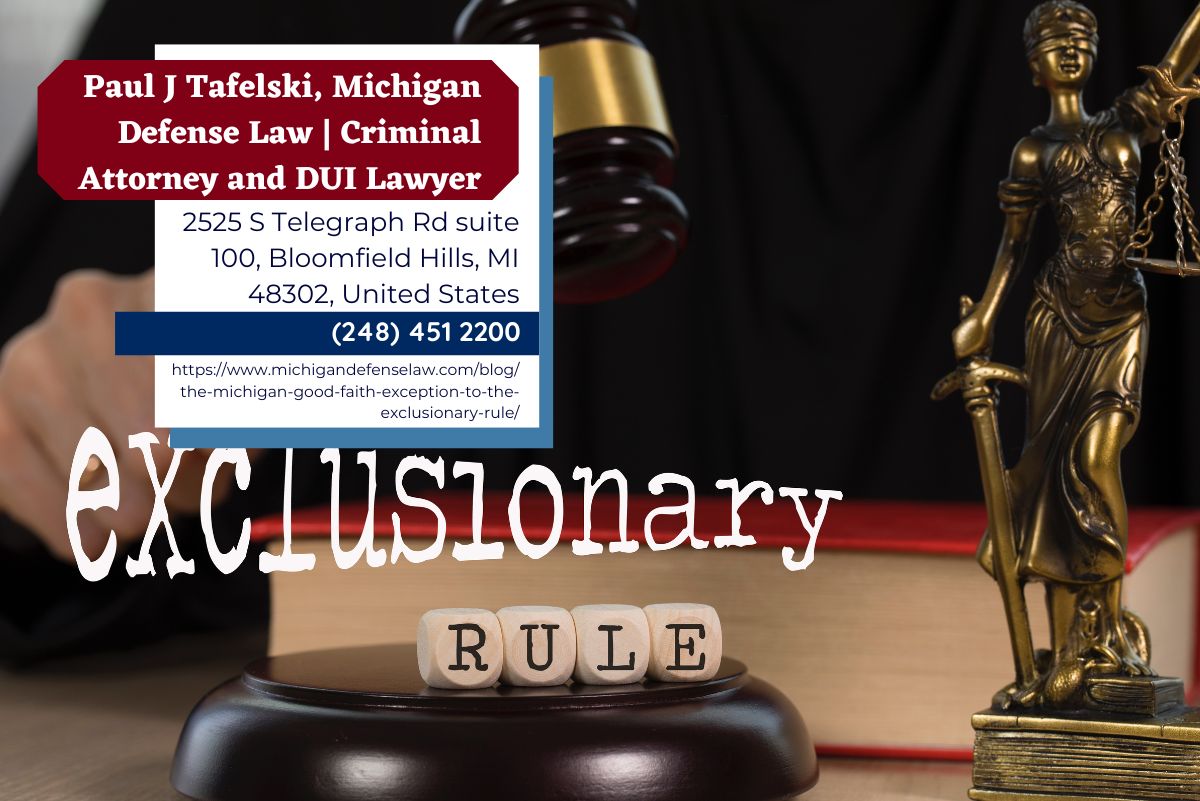Michigan criminal defense lawyer Paul J. Tafelski (https://www.michigandefenselaw.com/blog/the-michigan-good-faith-exception-to-the-exclusionary-rule/), a distinguished figure in the legal landscape, has recently published an insightful article titled ‘The Michigan Good Faith Exception to the Exclusionary Rule.’ The piece takes an in-depth look at this complex legal principle, which has significant implications for the state’s criminal justice system.
In the first paragraph, the Michigan criminal defense lawyer introduces readers to the concept of the exclusionary rule, a principle utilized within the U.S. legal system that restricts the use of evidence collected or analyzed in violation of a defendant’s constitutional rights. He goes on to explain that the exclusionary rule is not a hard-and-fast law but is subject to certain exceptions, one of which is the ‘good faith exception.’ This exception, recognized in several jurisdictions, including Michigan, permits the usage of evidence obtained in violation of an individual’s rights if law enforcement officials had a ‘good faith’ belief that they were acting within the confines of the law.
“The good faith exception is a nuanced aspect of Michigan law, and understanding it can be a complicated task,” said Paul J. Tafelski, the Michigan criminal defense lawyer behind the article. “It is essential for anyone facing criminal charges in Michigan to comprehend how this exception could influence their case.”
The article further dives into the origins, applications, and potential impacts of this exception on criminal proceedings, providing a comprehensive overview for readers. Tafelski emphasizes the value of a criminal defense lawyer in navigating the intricacies of the Michigan legal system and ensuring the protection of the defendant’s rights and interests.
The piece also offers a clear explanation of the exclusionary rule, detailing how it works to prevent law enforcement from violating citizens’ rights. It further explains the good faith exception, highlighting its limitations and how it functions in specific scenarios.
Commenting on a recent Michigan drug bust case, Tafelski points out how the good faith exception prevented the suppression of evidence, despite a defective search warrant. “The good faith exception has its limitations, but it can have significant consequences in court proceedings,” the Michigan criminal defense lawyer explains. “It’s vital to understand its implications.”
As the legal landscape continues to evolve, understanding the intricacies of laws and their exceptions can be the key to a successful defense. Tafelski’s article is a valuable resource in shedding light on the complexities of the Michigan good faith exception to the exclusionary rule.
About Michigan Defense Law:
Michigan Defense Law is a reputable law firm with a team of dedicated lawyers committed to providing top-notch legal services. Founded by Paul J. Tafelski, the firm has a robust track record in tackling complex legal issues and ensuring a fair representation for their clients. Tafelski, with over 20 years of experience in the field, uses his extensive knowledge and skills to guide his clients through the often confusing criminal justice system. The team at Michigan Defense Law is dedicated to protecting the rights and interests of their clients, standing by their side every step of the way. Their commitment to justice, combined with their deep understanding of the Michigan legal system, makes them a reliable choice for those facing criminal charges.
Embeds:
Youtube Video: https://www.youtube.com/watch?v=CvFknNKmkUg
GMB: https://www.google.com/maps?cid=7441820969606749572
Email and website
Email: [email protected]
Website: https://www.michigandefenselaw.com/
Media Contact
Company Name: Michigan Defense Law
Contact Person: Paul J. Tafelski
Email: Send Email
Phone: (248) 451-2200
Address:2525 S Telegraph Rd suite 100
City: Bloomfield Hills
State: Michigan 48302
Country: United States
Website: https://www.michigandefenselaw.com/
